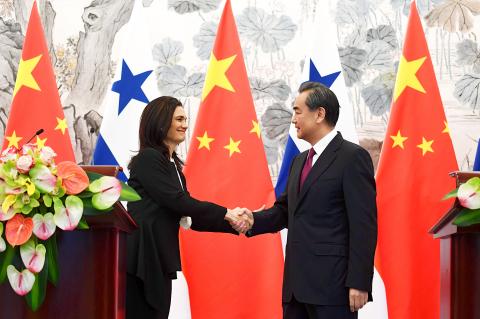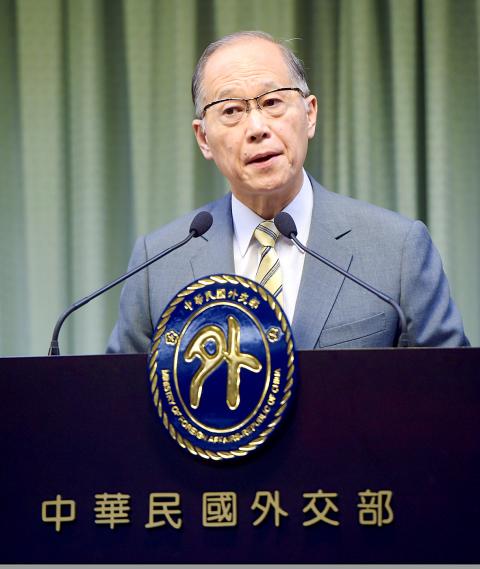Taiwan is cutting diplomatic ties with Panama after the Central American country switched diplomatic recognition from Taipei to Beijing, Minister of Foreign Affairs David Lee (李大維) announced yesterday.
“To safeguard our nation’s sovereignty and dignity, we have decided to terminate diplomatic ties with Panama immediately,” Lee said at a news conference, in which he also expressed Taiwan’s “deep anger and regret” about Panama’s decision.
Taiwan is also to halt all bilateral cooperative projects, cut all assistance to Panama, and pull out its diplomatic staff and technical missions from the country, Lee said.

Photo: AFP
Even though the two nations had maintained diplomatic ties for more than a century, Panamanian President Juan Carlos Varela caved in to Beijing for “economic interests” and ignored Taiwan’s long-term assistance that supported its overall development, Lee said.
Lee described Panama’s diplomatic switch as “most unfriendly” and accused Panama of “deceiving the Republic of China government until the last moment.”
He said that Taipei felt a sense of “strong dissatisfaction and anger” about the move, but reaffirmed that Taipei would not engage in a contest of “checkbook diplomacy” with Beijing.

Photo: Huang Yao-cheng, Taipei Times
Taiwan also “strongly protests and condemns Beijing for luring Panama to switch diplomatic ties, squeezing Taiwan’s space in the international community and hurting Taiwanese feelings,” he said.
Taiwan’s response came after Varela announced that Panama was establishing diplomatic ties with China, saying in a televised address that it represents the “correct path for our country.”
At the Diaoyutai State Guesthouse in Beijing yesterday, Chinese Minister of Foreign Affairs Wang Yi (王毅) and Panamanian Minister of Foreign Affairs Isabel de Saint Malo signed a joint communique establishing diplomatic relations, followed by a champagne toast.
Wang said he was sure relations between the two countries would have a “bright future.”
De Saint Malo said she hoped the new relationship would lead to trade, investment and tourism opportunities, in particular “exporting more goods from Panama to China.”
In the joint communique, Panama said it would not maintain any official ties with Taiwan and also agreed to recognize that there is only “one China” and that Taiwan is part of it.
Panama’s decision leaves Taiwan with 20 diplomatic allies, 11 of which are in Latin America and the Caribbean.
The decision is widely seen as a result of China’s mounting efforts to apply pressure on Taiwan since President Tsai Ing-wen (蔡英文) took office on May 20 last year.
Lee criticized Panama for keeping Taiwan in the dark about the move, but said there had been signs of Panama’s intentions and Taiwan used every means at its disposal to keep the Central American nation from moving in that direction, without going into specific details.
One of the signs was that Panama did not announce a successor after then-Panamanian ambassador to Taiwan Alfredo Martiz Fuentes on April 30 left his post to take over as Panama’s social security chief, even though Martiz told Tsai on April 20 that bilateral relations were solid.
In addition, Ambassador to Panama Miguel Tsao (曹立傑) has not been able to present his credentials since arriving in the country in the middle of last month.
The diplomatic rift came nearly one year after Tsai visited Panama in June last year on her first state visit.
Tsai attended the inaugural ceremony of the expanded Panama Canal and witnessed Taiwan’s donation of 3,000 boxes of flu medicine to help combat an epidemic of the H1N1 flu virus.
Ties between the Republic of China (ROC) and Panama date back more than a century, to when China's Qing Dynasty established diplomatic relations with Panama on Jan. 16, 1910. The ROC continued the relationship after its founding in January 1912.
Panama is the second diplomatic ally to cut ties since Tsai took office, the first being Sao Tome and Principe, which recognized Beijing in December last year.
In March last year, China re-established official ties with the Gambia, more than two years after the small African nation cut off relations with Taiwan.
Panama has actively sought to set up ties with China in the past.
According to a US Department of State diplomatic message released by WikiLeaks, Panama tried to establish relations with Beijing in 2009 without success.
Additional reporting by AP
This story has been amended since it was first published to correct the date of the establishment of diplomatic relations with Panama.

CHAOS: Iranians took to the streets playing celebratory music after reports of Khamenei’s death on Saturday, while mourners also gathered in Tehran yesterday Iranian Supreme Leader Ayatollah Ali Khamenei was killed in a major attack on Iran launched by Israel and the US, throwing the future of the Islamic republic into doubt and raising the risk of regional instability. Iranian state television and the state-run IRNA news agency announced the 86-year-old’s death early yesterday. US President Donald Trump said it gave Iranians their “greatest chance” to “take back” their country. The announcements came after a joint US and Israeli aerial bombardment that targeted Iranian military and governmental sites. Trump said the “heavy and pinpoint bombing” would continue through the week or as long

TRUST: The KMT said it respected the US’ timing and considerations, and hoped it would continue to honor its commitments to helping Taiwan bolster its defenses and deterrence US President Donald Trump is delaying a multibillion-dollar arms sale to Taiwan to ensure his visit to Beijing is successful, a New York Times report said. The weapons sales package has stalled in the US Department of State, the report said, citing US officials it did not identify. The White House has told agencies not to push forward ahead of Trump’s meeting with Chinese President Xi Jinping (習近平), it said. The two last month held a phone call to discuss trade and geopolitical flashpoints ahead of the summit. Xi raised the Taiwan issue and urged the US to handle arms sales to

State-run CPC Corp, Taiwan (CPC, 台灣中油) yesterday said that it had confirmed on Saturday night with its liquefied natural gas (LNG) and crude oil suppliers that shipments are proceeding as scheduled and that domestic supplies remain unaffected. The CPC yesterday announced the gasoline and diesel prices will rise by NT$0.2 and NT$0.4 per liter, respectively, starting Monday, citing Middle East tensions and blizzards in the eastern United States. CPC also iterated it has been reducing the proportion of crude oil imports from the Middle East and diversifying its supply sources in the past few years in response to geopolitical risks, expanding

An Emirates flight from Dubai arrived at Taiwan Taoyuan International Airport yesterday afternoon, the first service of the airline since the US and Israel launched strikes against Iran on Saturday. Flight EK366 took off from the United Arab Emirates (UAE) at 3:51am yesterday and landed at 4:02pm before taxiing to the airport’s D6 gate at Terminal 2 at 4:08pm, data from the airport and FlightAware, a global flight tracking site, showed. Of the 501 passengers on the flight, 275 were Taiwanese, including 96 group tour travelers, the data showed. Tourism Administration Deputy Director-General Huang He-ting (黃荷婷) greeted Taiwanese passengers at the airport and